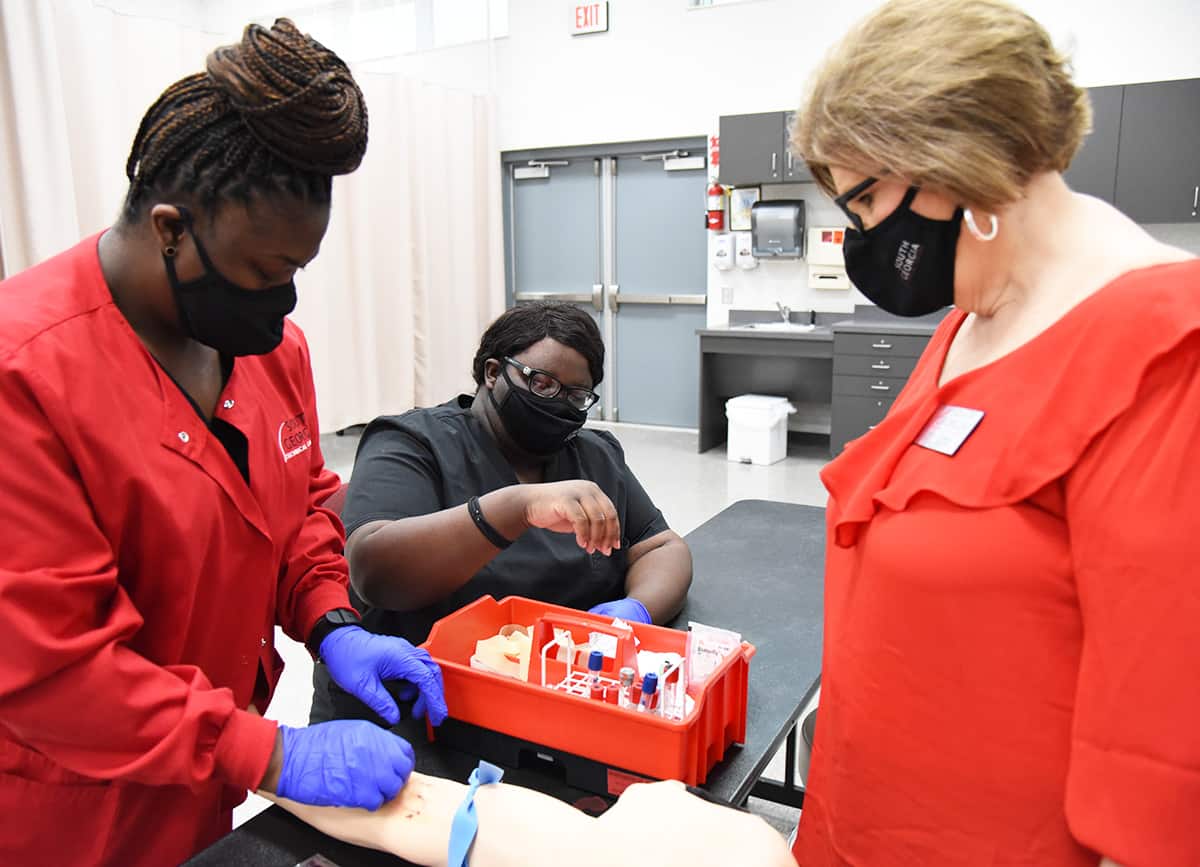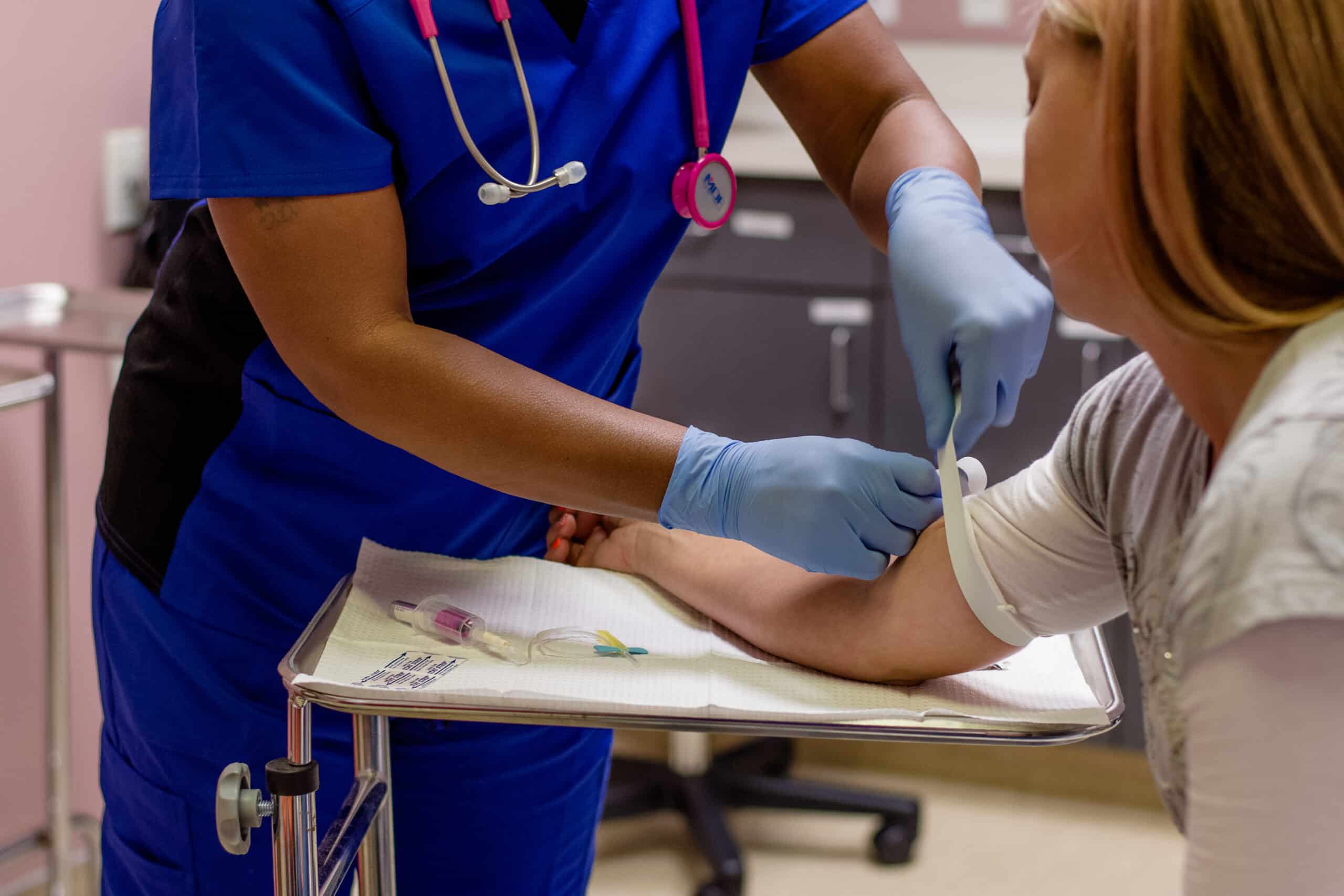Phlebotomy Classes Near Me: How Local Classes Boost Employability
Phlebotomy Classes Near Me: How Local Classes Boost Employability
Blog Article
The Course to Certification: Comprehending the Phlebotomy Training Training Course Journey and Its Relevance
As you think about the path to accreditation in phlebotomy, it's important to comprehend the duty you'll play in healthcare. Your training will cover vital abilities, from blood collection strategies to patient interaction. Each part of the program prepares you for the difficulties in advance. Yet just what does the trip involve, and why is accreditation so critical for your future profession? Allow's explore these concerns even more.

The Function of Phlebotomists in Medical Care
Phlebotomists play an important function in the medical care system, acting as the important web link in between people and necessary diagnostic testing. You'll carry out blood attracts, ensuring samples are gathered precisely and securely. Your know-how assists in identifying clinical problems, keeping track of health, and directing therapy decisions.
In your day-to-day communications, you'll need to establish count on with clients, making them feel comfortable throughout what could be a demanding experience. You're liable for classifying and dealing with samples meticulously to stop contamination or mistakes, which might influence examination results.
Past this, you'll typically work along with physicians and nurses, interacting crucial information concerning individuals' problems. By mastering your skills, you add meaningfully to patient treatment, making you a crucial component of the clinical group.
Summary of Phlebotomy Training Programs
When discovering phlebotomy training programs, you'll locate various kinds developed to fit different routines and finding out designs. Each program helps you develop important skills like blood collection and person interaction. Comprehending these choices is essential to picking the best course for your job.
Kinds Of Educating Programs
A number of kinds of training programs are available for those aiming to end up being proficient in phlebotomy. You can pick from certification programs, which normally last a couple of months and concentrate on important skills. There are also diploma programs that give an even more comprehensive education, often lasting approximately a year. If you're seeking a much deeper understanding, an associate level in a related field could be the best fit. On the internet programs use adaptability for those stabilizing job or family members dedications, allowing you to study at your own speed. Furthermore, some medical facilities and clinics offer on-the-job training programs, giving useful experience while you discover. Whatever path you choose, each program intends to outfit you with the essential skills for a successful phlebotomy job.

Trick Abilities Created
Grasping phlebotomy needs a set of key skills that are developed through complete training programs. Additionally, communication skills are essential; you'll need to communicate with individuals, explain procedures, and put them at ease. Each of these skills is essential for your success as a certified phlebotomist, making you an important asset in any medical care setup.
Trick Elements of a Phlebotomy Program
In a phlebotomy training course, you'll focus on necessary topics that lay the foundation for your future career. You'll take part in hands-on training that enables you to use what you've discovered in real-world setups. Both the curriculum and useful experience are vital for your success as a phlebotomist.
Curriculum Introduction
While pursuing a phlebotomy training course, you'll experience a curriculum developed to equip you with essential skills and expertise. Phlebotomy Courses Near Me. This educational program normally consists of composition and physiology, focusing on the circulatory system and comprehending blood components. You'll likewise learn more about various kinds of blood collection techniques, including venipuncture and capillary leak strategies
Additionally, infection control and safety and security procedures are crucial parts, guaranteeing you understand how to keep a sterilized environment. You'll examine patient interaction, emphasizing interaction and compassion, which are crucial for easing individual anxiousness. Honest and lawful factors to consider will be dealt with, preparing you for real-world obligations. This foundational understanding will certainly enable you to succeed as a phlebotomist and supply quality treatment in professional setups.
Hands-On Training Experience
Obtaining hands-on experience is an indispensable part of your phlebotomy training course. This functional training enables you to use what you've learned in a real-world setting, improving your abilities and self-confidence. You'll practice venipuncture methods, learn exactly how to handle different kinds of samplings, and get acquainted with the devices used in the area. Under the advice of seasoned trainers, you'll fine-tune your abilities, ensuring you're gotten ready for any kind of situation you may deal with.
Additionally, you'll obtain the opportunity to communicate with patients, which is vital for developing your communication abilities. news This combination of technological efficiency and social abilities is important for your success as a certified phlebotomist. Eventually, hands-on training is where concept fulfills method, solidifying your expertise and readiness for qualification.
Certification and Licensing Needs
Prior to you can begin your occupation in phlebotomy, it is important to recognize the certification and licensing requirements that differ by state. Most states call for phlebotomists to hold an accreditation from an acknowledged company, such as the National Phlebotomy Organization or the American Society for Medical Pathology. These qualifications typically entail passing an exam that tests your understanding and abilities in the area.
Along with accreditation, some states have certain licensing requirements. You might require to complete a specific variety of hours in scientific method, submit proof of training, or go through a background check. It is important to investigate your state's guidelines to make certain you fulfill all needed criteria.
Remaining notified concerning these demands not only helps you protect a setting but likewise boosts your trustworthiness as an expert. By fulfilling these needs, you'll be well on your means to a successful job in phlebotomy.
Hands-On Training and Practical Experience
Hands-on training and practical experience are crucial elements of your phlebotomy education, as they enable you to apply theoretical knowledge in real-world situations. During your training, you'll participate in supervised venipuncture, learn appropriate techniques, and end up being acquainted with numerous blood collection equipment. This straight participation is vital for building your self-confidence and refining your abilities.
You'll work carefully with skilled specialists that can direct you with the subtleties of person interaction and sample handling. Each technique session not just enhances your understanding yet likewise prepares you for the hectic setting of medical care setups.
In addition, several programs incorporate scientific turnings, enabling you to experience diverse setups, from medical facilities to outpatient clinics. This exposure helps you adapt to various difficulties and patient requirements, ensuring you're well-prepared for your future function. Embrace these opportunities, as they're vital to coming to be a competent and compassionate phlebotomist.
Obstacles Faced Throughout Training
While getting hands-on experience is crucial, it's vital to recognize the challenges that can arise during your phlebotomy training. You could run into anxiety when performing treatments on real patients, especially if you're new to the setting. The stress to get whatever right can be frustrating. In addition, grasping the abilities needed for blood draws takes technique; you may deal with method initially.
Time management can also be a hurdle, as harmonizing concept, functional sessions, and personal commitments can feel daunting. You might deal with differing learning rates amongst your peers, causing feelings of self-doubt if you believe you're dropping behind. Ultimately, adapting to the different individualities of teachers can be difficult, as each might have a special training design.
Identifying these obstacles at an early stage can prepare you for success and help you create durability throughout your training trip.
Profession Opportunities After Certification

As you acquire experience, you could even take into consideration concentrating on areas like pediatric or geriatric phlebotomy, accommodating particular client demands. Some phlebotomists select to progress their jobs by becoming lab specialists or seeking additional education and learning in this health care fields.
In addition, your certification can cause duties in training or supervising brand-new phlebotomists, allowing you to share your straight from the source expertise. With the medical care sector constantly growing, your skills will certainly always remain in demand, leading the way for a secure and meeting occupation. Accept the opportunities waiting on you!
Regularly Asked Concerns
What Is the Common Duration of a Phlebotomy Educating Course?
Phlebotomy training courses generally last around 4 to eight weeks. You'll take part in hands-on method, classroom direction, and online discovering. Completing this training prepares you for accreditation and a satisfying job in medical care.
Are Online Phlebotomy Courses Available?
Yes, online phlebotomy training courses are offered. They offer versatility and comfort, allowing you to examine at your very own rate. Just validate the program is approved to satisfy accreditation demands and acquire important skills for your job.
Just How Much Does Phlebotomy Training Generally Cost?
Phlebotomy training usually sets you back in between $700 and $2,500, depending upon the program and location. You should consider elements like training course size, included materials, and hands-on experience when selecting the best training for you.
What Prevail Requirements for Phlebotomy Training?
Common prerequisites for phlebotomy training frequently include a high school diploma or GED, booster shots, and a history check. Some programs might likewise need fundamental healthcare knowledge or certifications, ensuring you're planned for hands-on training.
Can I Function While Completing My Phlebotomy Training?
Yes, you can work while finishing your phlebotomy training. Numerous students equilibrium tasks with their researches, yet ensure to handle your time successfully to guarantee you fulfill both job and training dedications effectively.
Report this page